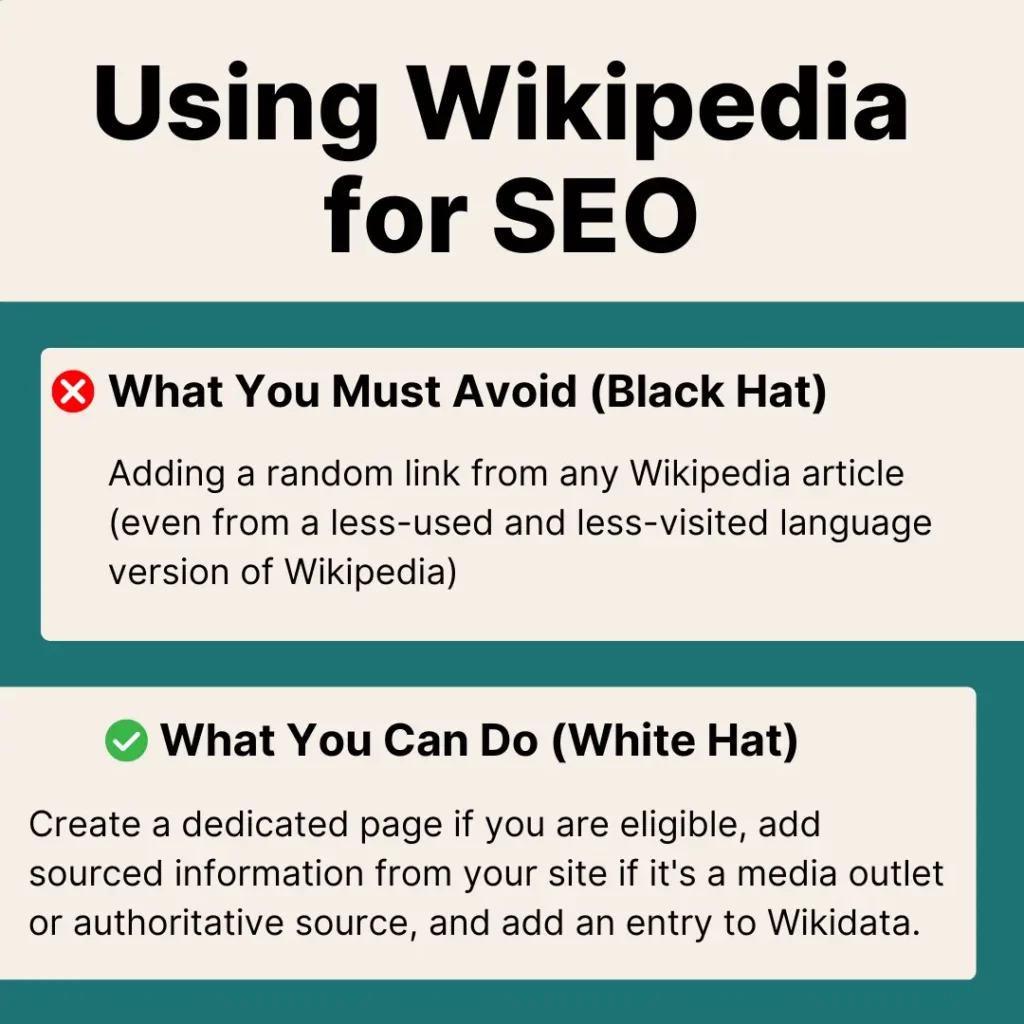Using Wikipedia for SEO is tempting. Many SEO consultants resort to risky and often ineffective techniques.
At Wikiconsult, we focus on ethical, sustainable SEO for lasting results. What is black hat SEO on Wikipedia, and what are the best alternatives?
Let’s break it down.
Plan
Black Hat SEO Techniques on Wikipedia
The term black hat SEO refers to a set of “forbidden” techniques used to manipulate search engine algorithms and (theoretically) achieve quick results in search engine rankings.
At Wikiconsult, we believe in a sustainable web, based on transparent, ethical strategies that benefit everyone: your visitors, your partners, and you. While black hat tactics might seem attractive for quick gains, the risks are real: penalties, loss of visibility, or even removal from search engine results.
It’s even worse when combining black hat techniques with Wikipedia, because:
- Your site could be permanently blacklisted on Wikipedia: no more links will ever be made to it from the encyclopedia.
- Links on Wikipedia are no-follow. This means they have little to no impact on search engine algorithms like Google’s.
Now that these precautions are in place, here’s the “secret” technique that’s been around for ages and that almost every SEO consultant has tried on Wikipedia:
- Go to a less-visited version of Wikipedia. For example, Esperanto, Friulian, or Occitan.
- Pick an article at random and insert a citation link to the site you want to “boost.”
Since these language versions of Wikipedia are less monitored, your link might stay up longer.
However, links like this on pages in French or English are generally removed within hours. But more importantly, they offer no real value.
Let’s now look at more relevant techniques for improving your SEO using Wikipedia.

The White Hat SEO Techniques on Wikipedia
White hat SEO on Wikipedia relies on practices that respect the rules of the encyclopedia, aligned with principles of ethics and transparency.
These methods consist of contributing authentically by providing verifiable, high-quality information, while adhering to neutrality and editorial requirements (disclose your conflict of interest with the article you’re editing).
Here’s what it entails:
- Creating a page about yourself or your company, if eligible. Be sure to add a link to your website in the infobox and in the external links section.
- Contributing to an existing Wikipedia page by adding relevant information, written neutrally, and citing a page from your website as a source. This is suitable if you are a media outlet or authoritative site, but not if you just have a generic company blog without any recognition.
- Creating a new entry on Wikidata (wikidata.org), a project linked to Wikipedia with slightly less strict eligibility conditions. You can add a link to a relevant website, as long as you know how to add structured data.
🤓Train your team to manage Wikipedia the right way
Hands-on workshops designed for communication, PR & marketing teams.
Delivered live online – build lasting in-house expertise.
How to Know if You Can Have Your Own Wikipedia Page?
Wikipedia is not a directory, but an encyclopedia.
Contributors define the conditions for including a new entry. There are general notability criteria, as well as specific criteria depending on the subject of the page, such as whether it is about an organization, business, politician, artist, etc.
On the Wikiconsult website, you will find many resources to help you determine the specific criteria that apply to your case.
It is not advisable to attempt to create a page if your eligibility is not established, because:
- It will likely be deleted quickly;
- You may have much more difficulty recreating it in the future, as it will require a special procedure, a page restoration request.
👀Check your eligibility on Wikipedia with a notability audit
Request a comprehensive audit from us to determine your eligibility on the encyclopedia (delivered within 48 hours) or learn about alternative options that may be more relevant for your situation.
What About No-Follow Links from Wikipedia?
All external links on Wikipedia are marked as no-follow, regardless of where they appear (infobox, references, or external links section). From a strictly algorithmic perspective, this means they do not directly pass PageRank in the way traditional do-follow backlinks do. However, stopping the analysis there would be misleading.
First, Wikipedia has an exceptionally high domain authority. According to Moz, one of the most widely used SEO analysis platforms, Wikipedia’s Domain Authority is rated at 93/100.
Domain Authority is a metric designed to estimate how credible, relevant, and trustworthy a website is in the eyes of search engines. Links coming from such a highly authoritative environment contribute to a natural and balanced backlink profile, where no-follow and do-follow links coexist — something search engines expect to see.
Second, Wikipedia links generate real user traffic. Independent analyses suggest that roughly 3% of readers click on external links on Wikipedia pages.
(Source: Le pouvoir discret de Wikipédia (The Quiet Power of Wikipedia), written by the founder of Wikiconsult – See on amazon.)
When a link appears in a highly visible area, such as an infobox or a well-contextualized reference, it can drive qualified, intent-driven traffic to a website.
I hope this article has been helpful to you! Happy editing 🙂!

Written by Albin Guillaud
A Wikipedia contributor since 2014, with Wikiconsult I support businesses, institutions, public figures, and agencies looking to create, update, or monitor their presence on Wikipedia.